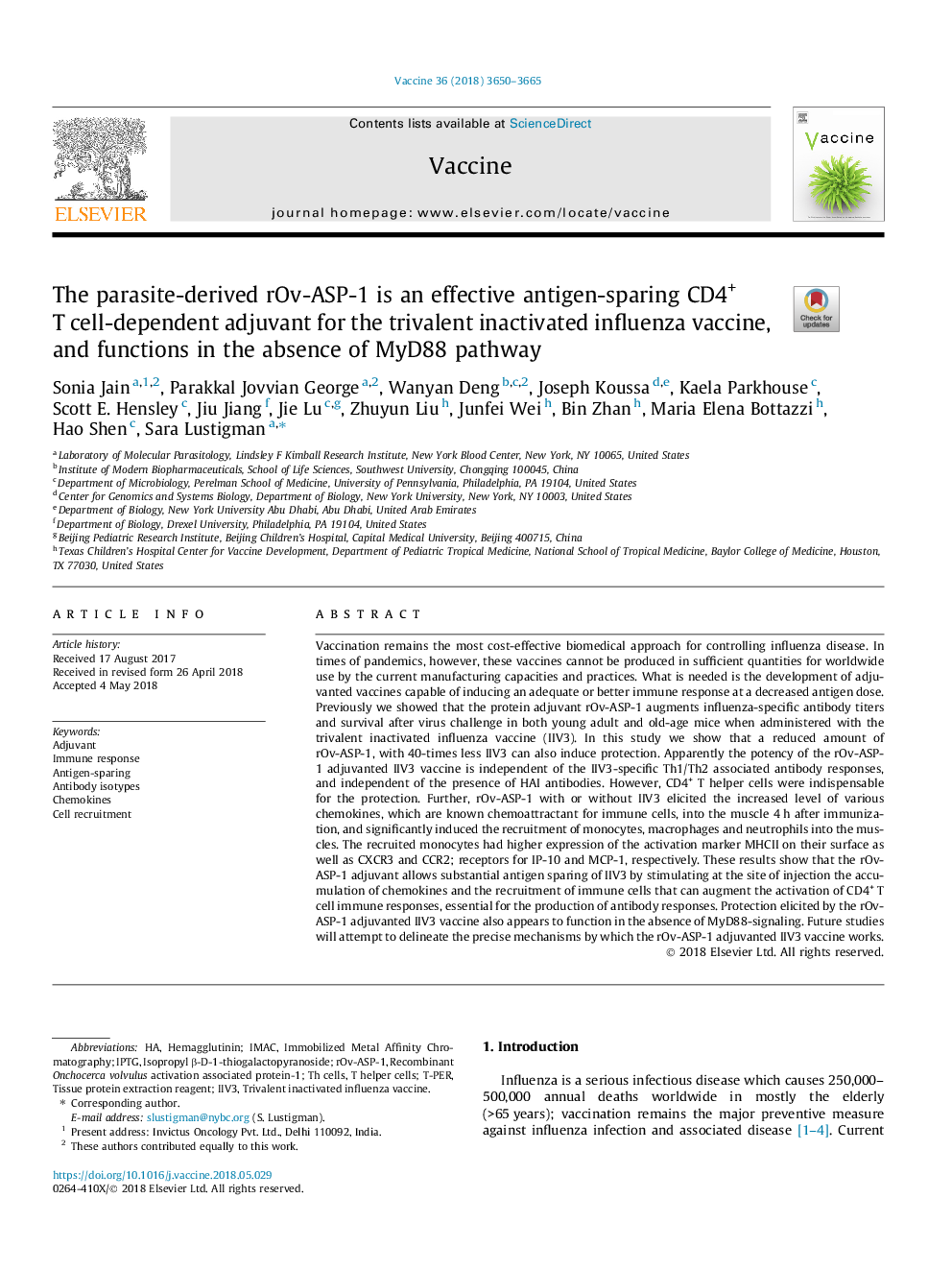| کد مقاله | کد نشریه | سال انتشار | مقاله انگلیسی | نسخه تمام متن |
|---|---|---|---|---|
| 8485594 | 1551743 | 2018 | 16 صفحه PDF | دانلود رایگان |
عنوان انگلیسی مقاله ISI
The parasite-derived rOv-ASP-1 is an effective antigen-sparing CD4+ T cell-dependent adjuvant for the trivalent inactivated influenza vaccine, and functions in the absence of MyD88 pathway
دانلود مقاله + سفارش ترجمه
دانلود مقاله ISI انگلیسی
رایگان برای ایرانیان
کلمات کلیدی
IPTGIMACT-PERTissue Protein Extraction ReagentIIV3Adjuvant - ادجوانت، یاورCell recruitment - استخدام سلولیAntibody isotypes - ایزوتایپ های آنتی بادیisopropyl β-D-1-thiogalactopyranoside - ایزوپروپیل β-D-1-thiogalactopyranosideTH cells - سلول های THT helper cells - سلول های کمکیhemagglutinin - هماگلوتینینTrivalent inactivated influenza vaccine - واکسن آنفلوآنزا غیر فعال شده سه گانهImmune response - پاسخ یا واکنش ایمنیChemokines - کرموین هاimmobilized metal affinity chromatography - کروماتوگرافی وابسته به فلز متمرکز
موضوعات مرتبط
علوم زیستی و بیوفناوری
ایمنی شناسی و میکروب شناسی
ایمونولوژی
پیش نمایش صفحه اول مقاله

چکیده انگلیسی
Vaccination remains the most cost-effective biomedical approach for controlling influenza disease. In times of pandemics, however, these vaccines cannot be produced in sufficient quantities for worldwide use by the current manufacturing capacities and practices. What is needed is the development of adjuvanted vaccines capable of inducing an adequate or better immune response at a decreased antigen dose. Previously we showed that the protein adjuvant rOv-ASP-1 augments influenza-specific antibody titers and survival after virus challenge in both young adult and old-age mice when administered with the trivalent inactivated influenza vaccine (IIV3). In this study we show that a reduced amount of rOv-ASP-1, with 40-times less IIV3 can also induce protection. Apparently the potency of the rOv-ASP-1 adjuvanted IIV3 vaccine is independent of the IIV3-specific Th1/Th2 associated antibody responses, and independent of the presence of HAI antibodies. However, CD4+ T helper cells were indispensable for the protection. Further, rOv-ASP-1 with or without IIV3 elicited the increased level of various chemokines, which are known chemoattractant for immune cells, into the muscle 4â¯h after immunization, and significantly induced the recruitment of monocytes, macrophages and neutrophils into the muscles. The recruited monocytes had higher expression of the activation marker MHCII on their surface as well as CXCR3 and CCR2; receptors for IP-10 and MCP-1, respectively. These results show that the rOv-ASP-1 adjuvant allows substantial antigen sparing of IIV3 by stimulating at the site of injection the accumulation of chemokines and the recruitment of immune cells that can augment the activation of CD4+ T cell immune responses, essential for the production of antibody responses. Protection elicited by the rOv-ASP-1 adjuvanted IIV3 vaccine also appears to function in the absence of MyD88-signaling. Future studies will attempt to delineate the precise mechanisms by which the rOv-ASP-1 adjuvanted IIV3 vaccine works.
ناشر
Database: Elsevier - ScienceDirect (ساینس دایرکت)
Journal: Vaccine - Volume 36, Issue 25, 14 June 2018, Pages 3650-3665
Journal: Vaccine - Volume 36, Issue 25, 14 June 2018, Pages 3650-3665
نویسندگان
Sonia Jain, Parakkal Jovvian George, Wanyan Deng, Joseph Koussa, Kaela Parkhouse, Scott E. Hensley, Jiu Jiang, Jie Lu, Zhuyun Liu, Junfei Wei, Bin Zhan, Maria Elena Bottazzi, Hao Shen, Sara Lustigman,